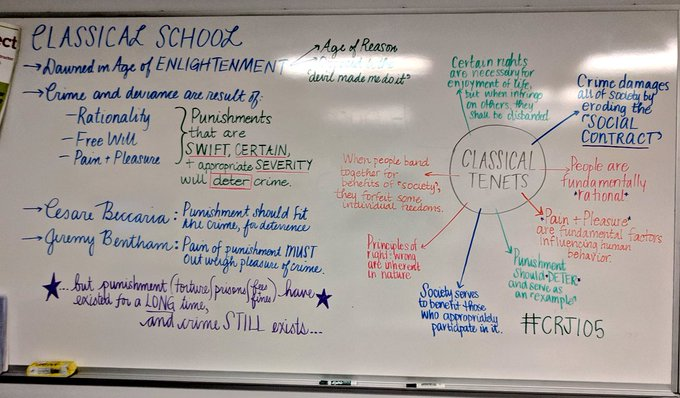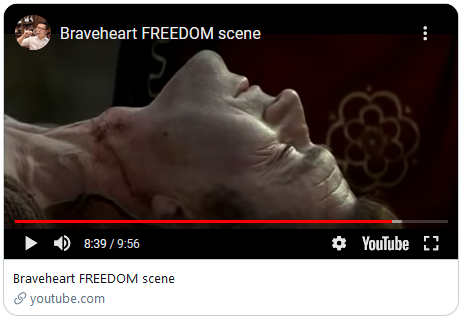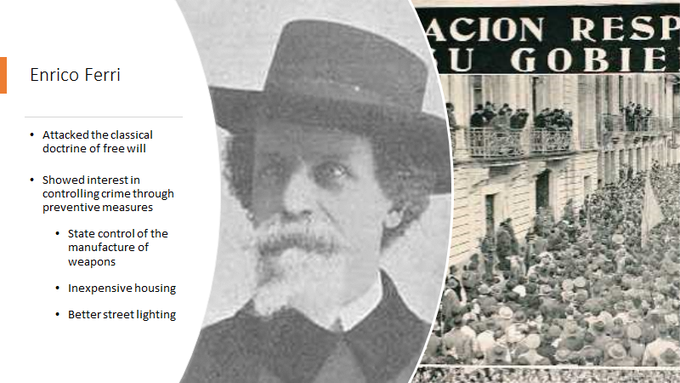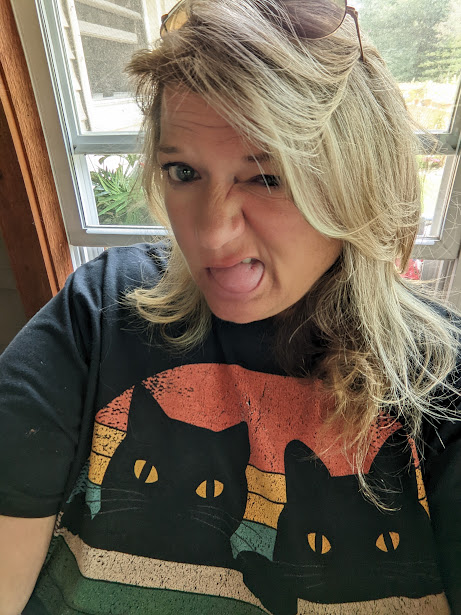THINKING CHALLENGE: From your common sense, why do people break the law?
Join me at 10:30am, cst, today to discuss!
#CRJ105 #MoraineValley
Join me at 10:30am, cst, today to discuss!
#CRJ105 #MoraineValley
Good morning friends, thank you for joining me to discuss the history of Criminology, covering Chapter 03.
#HistoryOfCriminology #CRJ105 #Criminology
#HistoryOfCriminology #CRJ105 #Criminology

Before we get started with Unit 02, I wanted to check in how the course is progressing for you so far. Now that we've got one unit under our belt, how is online learning treating you?
#CRJ105 #CRJ105CourseSurvey
#CRJ105 #CRJ105CourseSurvey
Overall, have I been clear & consistent in my communication? Would more or less input, via the course announcements be helpful?
#CRJ105 #CRJ105CourseSurvey
#CRJ105 #CRJ105CourseSurvey
What have I missed? If you have ANY insight on how the class could run smoother, I'd appreciate your letting me know, in the comments, via email, via my office phone.
I'm here to help! #CRJ105 #CRJ105CourseSurvey
I'm here to help! #CRJ105 #CRJ105CourseSurvey
And before I forget, I'd be curious if anyone else might be following the thread. @CPD1617Scanner
Are you ... #CRJ105 #CRJ105CourseSurvey
Are you ... #CRJ105 #CRJ105CourseSurvey
Over the next 2 weeks we will get in the way-back machine to very old Criminology to current Biological & Psychological theories.
#CRJ105 #MoraineValley
#CRJ105 #MoraineValley
We will see how some things have drastically changed and we haven't moved too far away from some of our historic belief systems
#CRJ105 #MoraineValley
#CRJ105 #MoraineValley

I LOVE history. It was one of my undergraduate degrees! History is essential to understanding why/how things are done today.
#CRJ105 #MoraineValley
#CRJ105 #MoraineValley
I certainly understand why some do NOT enjoy history. What makes history ... less than entertaining?
#CRJ105 #MoraineValley
#CRJ105 #MoraineValley
Chapter 03 is a brief introduction to the theories that we will continue to look at more in-depth through the next 14 weeks. Don't worry if this seems to fly by, we will get into each theory in more detail!
#CRJ105 #MoraineValley
#CRJ105 #MoraineValley

This week we are going to delve into the ROOTS of modern theory, breaking up history into two historic periods of understanding human behavior.
And they couldn't be MORE different! #CRJ105 #MoraineValley
And they couldn't be MORE different! #CRJ105 #MoraineValley

Pssst, don't let the teacher know I told you, this is a very very veryyyy helpful chart, book mark it!
(ahem, ahem, super helpful)
#CRJ105 #MoraineValley
(ahem, ahem, super helpful)
#CRJ105 #MoraineValley

In the late eighteenth to the mid-nineteenth centuries, during what is now called the “neoclassical period,” the classical culture of the ancient Mediterranean was rediscovered.
#CRJ105 #MoraineValley
#CRJ105 #MoraineValley

This was also a period of scientific discoveries and the founding of new scholarly disciplines. One of these disciplines was criminology
#CRJ105 #MoraineValley
#CRJ105 #MoraineValley

The Classical School of Criminology developed as an attempt to apply rationality and the rule of law to brutal and arbitrary criminal justice processes.
#CRJ105 #MoraineValley
#CRJ105 #MoraineValley

Prior to this time, most understanding of behavior was based on religious or spiritual beliefs.
In other words, if someone 'acted bad',
well ... the devil made them do it
#CRJ105 #MoraineValley
In other words, if someone 'acted bad',
well ... the devil made them do it
#CRJ105 #MoraineValley
Prior to this time, most understanding of behavior was based on religious or spiritual beliefs. In other words, if someone 'acted bad', well ... the devil made them do it!
#CRJ105 #MoraineValley
#CRJ105 #MoraineValley
Medieval & colonial "trials" / punishments are examples of spiritual explanations of unusual &/or criminal behavior
#CRJ105 #MoraineValley
#CRJ105 #MoraineValley

Medieval punishment was public, emphasizing the societal belief that it was a citizen's duty to help banish evil through public example
#CRJ105 #MoraineValley
#CRJ105 #MoraineValley
Classical criminology grew out of a reaction against the barbaric system of law, punishment, and justice that existed before the French Revolution of 1789. Until that time, there was no organized system of criminal justice in Europe
#CRJ105 #MoraineValley
#CRJ105 #MoraineValley
Prior to this, criminal laws were unwritten, and those that had been drafted, by and large, did not specify the kind or amount of punishment associated with various crimes
#CRJ105 #MoraineValley
#CRJ105 #MoraineValley

The growing educated classes began to see the inconsistency in these policies. If terrible tortures were designed to deter crime, why were people committing even more crimes?
#CRJ105 #MoraineValley
#CRJ105 #MoraineValley

Take this classic scene from the 1995 film Braveheart as an example how torture was used, William Wallace (Mel Gibson) can only 'save himself' by pleading for mercy, in other words, confessing guilty
#SPOILERALERT (27 years is enough time, right?)

#SPOILERALERT (27 years is enough time, right?)

And here, across the pond, the colonies even dabbled in their use of spiritual explanations ... who remembers those Colonial girls gone wild of the #SalemWitchTrials?
#CRJ105 #MoraineValley
#CRJ105 #MoraineValley

And yes, I just dubbed the Salem Witch Trials with the moniker of colonial girls gone wild
#CRJ105 #MoraineValley
#CRJ105 #MoraineValley
What ushered in the Classical School and a more measured way to examine behavior?
The Age of Enlightenment
#CRJ105 #MoraineValley
The Age of Enlightenment
#CRJ105 #MoraineValley

Refresh your memory from your high school humanities class on this important era thank you
@johngreen
@thecrashcourse
#CRJ105 #MoraineValley
@johngreen
@thecrashcourse
#CRJ105 #MoraineValley
Classical criminology focused on ideas of:
~ Rationality & Free Will
~ Utilitarianism
~ Hedonistic Calculus
#CRJ105 #MoraineValley
~ Rationality & Free Will
~ Utilitarianism
~ Hedonistic Calculus
#CRJ105 #MoraineValley

In March 1763, Cesare Beccaria was assigned to prepare a report on the prison system.
#CRJ105 #MoraineValley
#CRJ105 #MoraineValley

Contrary to expectations, Beccaria presented a comprehensive design for an enlightened criminal justice system that was to serve the people .... rather than the monarchy.
#CRJ105 #MoraineValley
#CRJ105 #MoraineValley
According to Beccaria, the crime problem could be traced not to bad people ...
but to bad laws.
#CRJ105 #MoraineValley #BadLaws #CrimesAndPunishments
but to bad laws.
#CRJ105 #MoraineValley #BadLaws #CrimesAndPunishments

The impact of Beccaria’s treatise spread across the Atlantic as well:
It influenced the first 10 amendments to the U.S. Constitution, aka a little thing we like to call the Bill of Rights
#CRJ105 #MoraineValley
It influenced the first 10 amendments to the U.S. Constitution, aka a little thing we like to call the Bill of Rights
#CRJ105 #MoraineValley

Beccaria's blueprint was based on the assumption that people freely choose what they do and are responsible for the consequences of their behavior
#CRJ105 #MoraineValley #FreeChoice
#CRJ105 #MoraineValley #FreeChoice
In this brief crash course, here is a summary of his essay on crime and punishment, including Beccaria 's theory, beliefs, and philosophy
#CRJ105 #MoraineValley
#CRJ105 #MoraineValley
THINKING CHALLENGE: Of Beccaria's Prepositions, which do you think are more significant today?
Capital punishment should be abolished
Use of torture to gain confessions should be abolished
Better to prevent crimes than to punish them
Capital punishment should be abolished
Use of torture to gain confessions should be abolished
Better to prevent crimes than to punish them
Jeremy Bentham’s Utilitarianism:
Utilitarianism assumes that all human actions are calculated in accordance with their likelihood of bringing happiness (pleasure) or unhappiness (pain).
#CRJ105 #MoraineValley
Utilitarianism assumes that all human actions are calculated in accordance with their likelihood of bringing happiness (pleasure) or unhappiness (pain).
#CRJ105 #MoraineValley

Classical criminology had an immediate and profound impact on jurisprudence and legislation
#CRJ105 #MoraineValley
#CRJ105 #MoraineValley

The Classical School argued that people have the ability to think through their decisions, to think rationally
#CRJ105 #MoraineValley
#CRJ105 #MoraineValley

THINKING CHALLENGE: Do you believe human beings have the ability to control their rationality?
#CRJ105 #MoraineValley
#CRJ105 #MoraineValley
The Classical School moved sharply away from the "devil made me do it" and divine intervention, arguing individuals have free will.
#CRJ105 #MoraineValley
#CRJ105 #MoraineValley

The Classical School also proposed the concept of hedonistic calculus, that at their very nature, human beings will seek pleasure and avoid discomfort
#CRJ105 #MoraineValley
#CRJ105 #MoraineValley

Adding together rationality, free will, and a human being's nature desire to avoid pain, the Classical School proposed the concept of #deterrence
#CRJ105 #MoraineValley
#CRJ105 #MoraineValley

IN OTHER WORDS: The Classical School was not as concerned with individual criminals as it was with criminal law.
Fear of punishment will keep people from committing crime. #CRJ105 #MoraineValley
Fear of punishment will keep people from committing crime. #CRJ105 #MoraineValley

In Summary: People freely choose all their behavior; that motives such as greed, revenge, need, anger, lust, jealousy, thrill-seeking, and vanity are just expressions of free will, personal choice, conclusion, & decision-making that people have made
#CRJ105 #MoraineValley
#CRJ105 #MoraineValley

In Summary: Choices can be controlled by fear of punishment; because people weigh the potential benefits and consequences of crime
#CRJ105 #MoraineValley
#CRJ105 #MoraineValley
In Summary: The more certain, swift, and severe the punishment, the greater is its ability to control criminal behavior, especially if the punishment is fair and serves some rational and legitimate purpose
#CRJ105 #MoraineValley
#CRJ105 #MoraineValley

THINKING CHALLENGE: Have you ever said or done something that you "didn't mean" ... because you were angry?
#CRJ105 #MoraineValley
#CRJ105 #MoraineValley
THINKING CHALLENGE: Have you ever acted completely out of character due to jealousy?
#CRJ105 #MoraineValley
#CRJ105 #MoraineValley
THINKING CHALLENGE: Have you ever taken on a challenge just because some said you couldn't do it ... or because it was a dare?
#CRJ105 #MoraineValley
#CRJ105 #MoraineValley
THINKING CHALLENGE: Have you ever ... wished ill will on someone else, because maybe, just maybe, they broke your heart?
#CRJ105 #MoraineValley
#CRJ105 #MoraineValley
What I am getting at here, are there moments in which our emotions overtake our decision making?
#CRJ105 #MoraineValley
#CRJ105 #MoraineValley
-OR- and hear me out ... are all your emotional responses your choice in how you are perceiving your environment?
#CRJ105 #MoraineValley
#CRJ105 #MoraineValley
The #ClassicalSchool indicates that your emotions are YOUR rational response to what is happening around you. And if that is the case, you can choose how you react
#CRJ105 #MoraineValley
#CRJ105 #MoraineValley
The Classical School: Choices can be controlled by fear of punishment; because people weigh the potential benefits and consequences of crime
#CRJ105 #MoraineValley
#CRJ105 #MoraineValley

The Classical School: The more certain, swift, and severe the punishment, the greater is its ability to control criminal behavior, especially if the punishment is fair and serves some rational and legitimate purpose
#CRJ105 #MoraineValley
#CRJ105 #MoraineValley

I have to say, this all sounds great! I can think of a lot of punishments I try to avoid. What do YOU do when you see a police cruiser running radar on the side of the road?
#CRJ105 #MoraineValley
#CRJ105 #MoraineValley
So if the #CLassicalSchool is valid, that means everyone having an understanding of punishment, should ... reduce crime!
#CRJ105
#CRJ105
But that brings us back to our initial question. Most individuals in society are aware of the Criminal Justice system, specifically that prisons exist.
... AND ... crime still exists.
Why? #CRJ105
... AND ... crime still exists.
Why? #CRJ105
So we really have to discuss how and if crime is rational, and if it's true of all crime?
#CRJ105 #MoraineValley
#CRJ105 #MoraineValley
Not until Charles Darwin (1809–1882) challenged the doctrine of creation with his theory of the evolution of species did the next generation of criminologists have the tools with which to challenge classicism
#CRJ105 #MoraineValley

#CRJ105 #MoraineValley


The nineteenth-century forces of #positivism and evolution moved the field of criminology from a philosophical to a scientific perspective
#CRJ105 #MoraineValley
#CRJ105 #MoraineValley

So while Darwin's work did not focus on human behavior, his work set the precedent of using scientific methods to better understand human differences
#CRJ105 #Positivism
#CRJ105 #Positivism

If criminals were born "defective", then social scientists could examine & measure how these individuals were different, whether
~ Biologically
~ Psychologically
~ Socially
#CRJ105 #Positivism
~ Biologically
~ Psychologically
~ Socially
#CRJ105 #Positivism

Through the use of scientific methods, understanding biological, psychological, and social differences, then negative differences can be eradicated ... reducing crime!
#CRJ105 #Positivism
#CRJ105 #Positivism
The school of human physiognomy is the study of facial features and their relation to human behavior.
#Phrenology posited that bumps on the head were indications of psychological propensities.
#CRJ105 #MoraineValley
#Phrenology posited that bumps on the head were indications of psychological propensities.
#CRJ105 #MoraineValley

Cesare Lombroso (1835–1909) integrated Comte’s positivism, Darwin’s evolutionism, and the many pioneering studies of the relation of crime to the body
#CRJ105 #MoraineValley
#CRJ105 #MoraineValley

“Insane criminals” become criminal as a result of some change in their brains that interferes with their ability to distinguish between right and wrong.
“Criminoloids” make up habitual criminals, criminals by passion, and other diverse types.
#CRJ105 #MoraineValley
“Criminoloids” make up habitual criminals, criminals by passion, and other diverse types.
#CRJ105 #MoraineValley

Ferri, a student of Lombroso, believed that criminals could not be held morally responsible because they did not choose to commit crimes but, rather, were driven to commit them by conditions in their lives.
#CRJ105 #MoraineValley
#CRJ105 #MoraineValley

Influenced by Lombroso’s theory of atavistic stigmata, in which he found many shortcomings, Garofalo traced the roots of criminal behavior not to physical features but to their psychological equivalents, which he called “moral anomalies.”
#CRJ105 #MoraineValley
#CRJ105 #MoraineValley

Although Lombroso, Ferri, and Garofalo did not always agree on the causes of criminal behavior or on the way society should respond to it, their combined efforts marked a turning point in the development of the scientific study of crime
#CRJ105 #MoraineValley
#CRJ105 #MoraineValley
Classic criminologists thought the problem of crime might be solved through limitations on governmental power, the abolition of brutality, and the creation of a more equitable system of justice.
#CRJ105 #MoraineValley
#CRJ105 #MoraineValley

Positivist criminologists influenced judges to give greater consideration to the offender than to the gravity of the crime when imposing sentences.
#CRJ105 #MoraineValley
#CRJ105 #MoraineValley

THINKING CHALLENGE: What school of thought more closely aligns with your current viewpoints on crime?
#CRJ105 #MoraineValley
#CRJ105 #MoraineValley
THINKING CHALLENGE: What school of thought has the larger fingerprint on the system today?
#CRJ105 #MoraineValley
#CRJ105 #MoraineValley
In the next several weeks, we will dive into Biological & Psychological explanations of crime. What sounds most intriguing to you?
#CRJ105 #MoraineValley
#CRJ105 #MoraineValley
Criminals might not be "born" to be bad, but the criminal disposition may be present at birth.
THINKING CHALLENGE: Which of the following is most associated with criminal behavior?
#CRJ105 #MoraineValley
THINKING CHALLENGE: Which of the following is most associated with criminal behavior?
#CRJ105 #MoraineValley
Next Monday, we will look at Biological Traits, which sounds most interesting to you?
#CRJ105 #MoraineValley
#CRJ105 #MoraineValley
In honor of our trip to the Galapagos, send me a favorite vacation photo for extra credit with your response. A few weeks ago I took my son to my alma mater, a great trip
#CRJ105 #MoraineValley
#CRJ105 #MoraineValley

• • •
Missing some Tweet in this thread? You can try to
force a refresh























